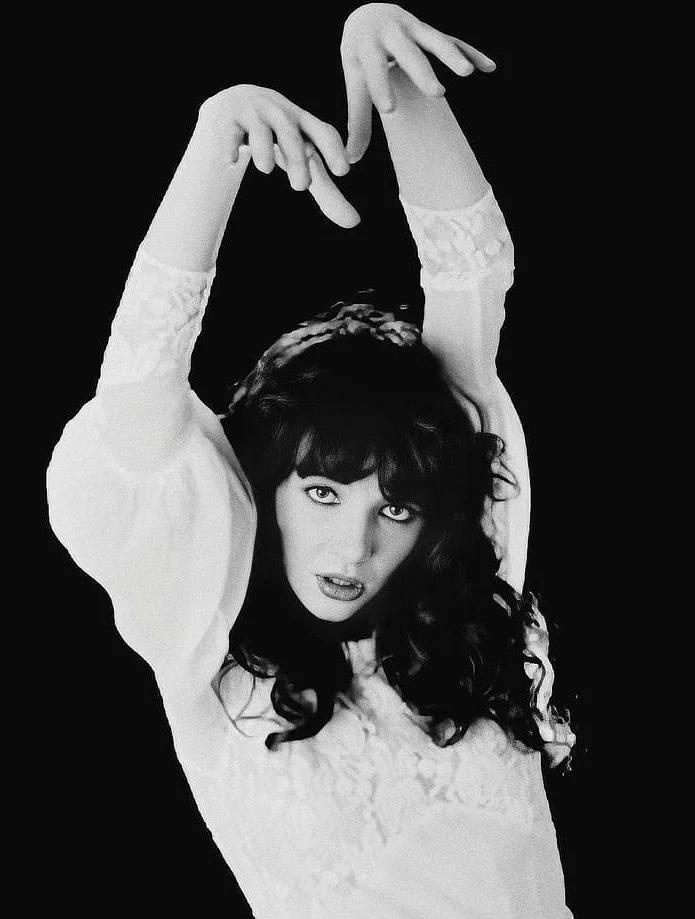
4 minute read
Kate Bush and the Power of the Feminine by Elise Hudson A Short History and Sample Platter of the “Think” Break by
by nofidel
Kate Bush and the Power of the Feminine
Elise Hudson
Advertisement
Above all else, Kate Bush is a storyteller. From three minute vignettes like “There Goes a Tenner” to her epic half-album saga “The Ninth Wave” (the second half of her 1985 Hounds of Love), Bush fleshes out lush worlds filled with strange characters and unusual plots. And she hardly confines herself to one genre of story. Kate Bush sings about everything from the daughter of the inventor of a cloud machine and her ensuing struggles with the government (“Cloudbusting”) to nuclear apocalypse as experienced by a fetus (“Breathing”) to having sex with a snowman (yes, really, listen to “Misty” off of 50 words for Snow.)
But despite the breadth of her subject material, much of Bush’s work is tied together by a focus on the female experience. Through her music, Kate Bush provides unique insight into the way women experience childhood, motherhood, love, sex, grief, and death. Her characters are complex - sometimes good, sometimes bad, often somewhere in between, and fleshed out with the emotional depth that female characters deserve but so rarely are given.
Bush’s fixation on the feminine, while at times inwardly directed, is more often focused on capturing a collective female psyche through telling a wide array of individual stories. Some of these center on the historical. In “Army Dreamers”, Bush sings in a fake Irish accent as she recounts the thoughts of a woman who has just lost her son at war. While the content of the song is mournful, the melody is lilting, not monotone. This tone reflects the expectation for women to stay silently strong in the face of adversity rather than sink into the dreaded “hysteria.” When Bush sings about women experiencing loss (“The Wedding List”, “Houdini”, “This Woman’s Work”) she highlights their perseverance by avoiding grim durges and going for something more nuanced. Grief is complex, and Bush illuminates its other aspects, such as wistfulness, guilt, and anger in addition to sadness. Female grief is often reduced solely to hysteria, and Bush paints a more complex picture.
Kate Bush is also known for her fascination with literature and folktales. The most iconic example of this is her breakout track “Wuthering Heights” (which is, as you probably guessed, about Emily Bronte’s book of the same name) but she has many other songs sung from the perspective of women in works of literature, such as “The Infant Kiss”, “Hammer Horror” and “Get Out of my House.” Her fascination with folklore manifests in songs such as “Jig of Life”, “The Red Shoes” and “The Kick Inside”, the title track from her first album which retells an old Irish folktale of a woman becoming pregnant through an incestious affair with her brother and subsequently killing herself. The song takes the form of a suicide note. By retelling these stories with a nuanced focus on the female characters, she gives these women of the past another chance to be heard.
While she is no stranger to tackling dark subjects, the way Bush communicates joy in her narratives is masterful. Much of her music revolves around love, love for the world, love for a lover, and the love between a mother and child. The way she portrays love is deeply feminine, not in adherence to stereotypes, but in its valuing of raw emotion over conquest.
Particularly trailblazing is the way Kate Bush sings about sex. It’s been a focus in her music from the very beginning. On her first album, Bush released songs such as “Feel it”, following them up in her second album with “Symphony in Blue”. Her fixation with sex culminated in 1989 with her album The Sensual World. Bush has always been so straightforward about addressing sex that it would come off as frank if not for her whimsical musical style. She manages to toe the thin line between being overly literal and relying too heavily on euphemisms. The perfect example of this balance is her song “The Sensual World.” The song is about pretty much what you would expect from the title. Kate is singing about sex, pure and simple. This is clear not only through the lyrics but also in how she sings, incorporating sighs and the like into her vocal delivery. Though the song is overtly sexual, it never feels vulgar, because she weaves it together so carefully. Part of this is in how she avoids describing a sexual power imbalance. In media, the masculine over feminine power imbalance in sex is so normalized that an alternative can seem impossible. Kate Bush’s music is a rare counterexample. In all of her songs about sex, Bush sings about how she feels. She isn’t preoccupied with describing the man in the situation, she instead focuses on her own emotions and sensations. She never expresses a desire to please, only her own raw desire. In a world where female sexuality is defined in terms of male pleasure, this type of songwriting is hugely subversive. Bush’s hyperfeminine affect gives her message even more power. Her high voice is quite stereotypically feminine but she falls into none of the tropes one would expect, and this contrast makes her message even more poignant.
Though she hasn’t released new music in over a decade, and hasn’t had a true run of records since the 80’s, Kate Bush’s music continues to be relevant and influential. She challenges gender conventions by leaning into her femininity and in turn expressing her womanhood as nuanced and important. Kate Bush’s music is emblematic of the fluid, collective strength of the feminine. You can hear it in her voice: expressive, ethereal, and powerful. ◆







